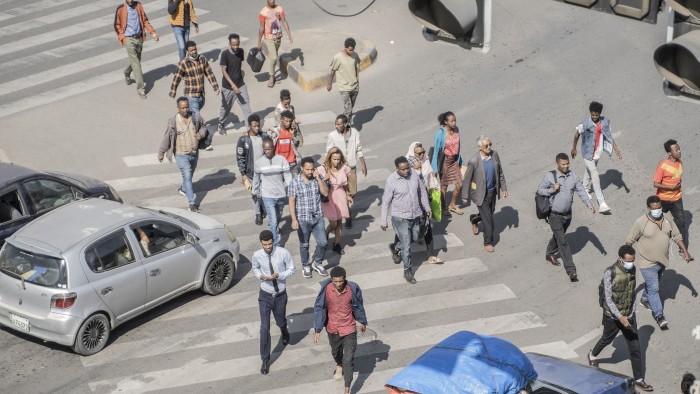Stay Informed with Free Updates
The author is an FT contributing editor and writes the Chartbook newsletter
In the midst of the world’s focus on artificial intelligence and the latest actions of US President Donald Trump, a significant global trend is quietly approaching. According to UN predictions, next year, the number of working-age individuals in sub-Saharan Africa will surpass that of the developed world.
This demographic shift in the world economy is monumental, yet it is likely to go unnoticed in the headlines due to the economic challenges faced by African nations. The lack of well-functioning institutions, capital, and technology hinders the growth potential of these economies. The World Bank estimates that the capital per worker in low-income countries, primarily in Africa, is only $5,000 per person, which is one-fifth of the amount in middle-income countries.
To unlock Africa’s potential, the African Development Bank advocates for a substantial investment of $400 billion annually. This level of investment would be comparable to the economic integration that propelled China into the global economy in the 1990s and 2000s. It has the potential to be a transformative narrative, overshadowing the current focus on crisis-ridden countries like Sudan and the Democratic Republic of Congo.
Historically, it was assumed that a large portion of the global population would always be impoverished. However, the economic growth of China and India provided hope that poverty eradication was attainable. The UN’s sustainable development goals in 2015 aimed to leverage public-private partnerships and blended finance to mobilize private investments and tackle poverty on a larger scale. Unfortunately, this approach has not yielded the anticipated results, with private funds flowing out rather than in.
The current structure of international economic institutions, such as the World Bank and IMF, is in need of reform. The US, with its influential role in these institutions, must address the solvency crisis faced by the poorest countries. Debt relief, fair bankruptcy protection for sovereign borrowers, and accountability for high-risk lending practices are essential components of a new global financial framework.
While the Trump administration’s stance on global development remains uncertain, there is potential for leadership to emerge from within Africa itself. South Africa’s focus on debt relief as the chair of the G20, along with potential support from Nigeria, could drive meaningful change in the continent’s economic landscape.
The future of globalization holds different implications for the global north and Africa. While trade wars may impact the prosperity of wealthy nations, Africa’s future hinges on its ability to participate fully in the mechanisms of global trade and investment. With a quarter of the world’s population projected to reside in Africa by 2050, the decisions made today will shape the opportunities and challenges faced by billions of individuals on the continent.








